An invasion of cats.
The little one and the Burghers of Calais.
In the 1970’s,
some my favorite moments
happened on my bike,
Riding to Trenton,
Through the streets of Atlanta,
Down Peachtree
Between cars.
Careening through the air,
Down a hill,
Over a ramp,
In a vacant lot.
Finding secret places.
Exploring the city.
Those magic places are everywhere.
If we open our eyes to them.
Epic Abstractions and Etruscan
Ruins,
Rays of light through glass.
Kids drawing.
Helen smiling,
Buttocks pouting,
Greek and Roman rooms on the first
floor,
Sculptures on the roof at the Met.
Dreams with Dad paying a visit on
Saturday.
Greeting me from a distance.
Are you really here?
What are you doing?
Dad huffs off,
Leaving just as soon he arrived,
Falling,
Scraping two elbows.
Bloody,
A lost car.
Always lost.
A smile on a bike among fragments
on a Saturday morning.
Morning sunrise.
Looking at our neighborhood,
taking new life.
Everyday life is always a
struggle.
High
planes drifter lulling me.
Feeling futile.
A week of actions ahead.
Uncertainty grasping.
Fragility.
Wondering if we’ve gone too far or
not far enough.
All you need to know of your
relationship is right there in that dream.
The cats come to visit.
Dancing in the morning light.
Pouring over the books of the day.
Lefebvre on Everyday Life.
The Overstory Richard Powers.
Looking to fight off the noonday demon.
Talismans.
“The history of a single day
includes the history of the world -- and of civilization; time, its source
unrevealed…” writes Henri Lefebvre, referring to Ulysses.
“Dublin, the city with its river
and bay, not merely a distinctive setting, the scene of action, but a mystical
presence, material city and image of the City,
“Dublin, the City, becomes all
Cities, the River stands for all rivers and waters…”
“…everyday life becomes less and
less bearable, less and less interesting…” confesses the philosopher.
Does it really?
Certainly, its harder to make
sense of.
The philosopher continues.
“Everyday life is made of recurences
fences: gestures of labour and leisure…hours, days, weeks, months, years,
linear and cyclical repetitions, natural and rational time, etc.”
Reading, getting ready for Marxism
after Marx with Stanley Aronowitz.
Back to the source, yet again:
I ride to class
where,
We share our
stories.
One narrative
after another.
“I grew up in the East Bronx,” Stanley begins.
“And played
violin. My mother was a musician and
dragged me to the opera.”
My mind drifts to
the night.
“I was born in the Bronx.” Andy V told Sarah Schulman
in the
ACT UP oral history. “My dad came from working class people. My dad was native Puerto Rican. My mother was born in Warsaw, she was
Jewish. And I was raised both in New
York and in Puerto Rico – learned to speak Spanish when I was really young and
was bi-lingual and I still am…My father married twice after that. And neither
one of them cared very much about their religion, as long as we didn’t take the
religion of the other. I briefly –
because we were solicited by a Presbyterian Church worker – attended
Presbyterian Church, in my early teens.
Then they started telling us about hell, and I was so busy jerking off
all the time and stealing from the donation plate,that I knew that was not the
place for me, so I headed right for the theater, and that’s where I found my
first tribe…”
The theater, that
was where Andy found his first tribe.
Stanley found his
in a factory with a union, locating a history of struggle:
“Marxism is one
stream out of the death of Marx in 1893. Others
were not recorded.
Socialism and
communism looks to be a worker’s movement,
in which the means of production shifts hands, when the Soviets
controlled the economy….”
I ask if we can
move toward Lefebvre and everyday life?
Why so much cruelty? Why the step
toward the totalitarian?
“They really have
not critiqued themselves, that they were a powerful state,” Stanley replies. “Lenin talked about it as a period of war
communism, devoting the conflict toward position. They turned on the anarchists
who helped them win the revolution in the first place, arresting them,
expelling them, putting them in jail.”
“What Lefebvre
was doing in Dialectical
Materialism, we know from the Soviet experience, abolition of
private property leads to new forms of autocracy,” posits Stanley.
Lefebvre begins
with a nod to Hegel and our everyday struggles.
“The life of the Spirit is not that life which shrinks from death
and seeks to keep itself clear of all corruption, but rather the life which
endures the presence of death within itself and preserves itself alive within death.”
“Everyday life was the layer below means of
production; it was the activity people lived,” Stanley continues. “The basic problem was the question of
everyday life. It disappears under
capitalism. Many of us are wage slaves, said Marx. Lefebvre builds on this. Sartre, Camus, Raymond
Aron, Maurice
Merleau-Ponty, - they all hung out calling for a new revolutionary
line. His break with the party was 1947.
What is everyday
life – to attain it in everyday life.
In the
neighborhood, the family as an arena of politics.”
Riding home from Stanley’s house, I think of the
kids, of Andy V, whose memorial is later
on in the day, of his everyday, a fight the my uncle over climate change, the
book group later in the afternoon. Constant
questions about everyday, one day could be everything, if I try to get it
right. Can we turn it around?
The little one
and I talk about the task at hand,
Share some
noodles over lunch.
She bids me adieu.
I head to
Activist Informed Reading Club.
Joni is hosting.
Catherine, Julie,
and Emily are there.
Petunia reviews
the text.
In between
stories about Ralph W E.
And Kathy Acker.
We should read
her Dox Quixote says Catherine.
We’re not all
sold on the Overstory.
A great concept, but the subjectivity of the trees remains to be
found.
Not like the Giving Tree, Anne Frank’s Diary, and JRR Tolkien where the trees
are everything:
“I thought all the trees were
whispering to each other, passing news and plots along in an unintelligible
language; and the branches swayed and groped without any wind. They do say
the trees do actually move, and can surround
strangers and hem them.”
When their travels come to an
end, Sam finds a favorite tree missing:
‘They’ve cut it down!’ cried Sam. ‘They’ve cut
down the Party Tree!’ He pointed to where the tree had stood under which Bilbo
had made his Farewell Speech. It was lying lopped and dead in the field. As if
this was the last straw Sam burst into tears.”
“We'll
make an army in the trees and bring the earth and the people on it to their
senses.”
writes The Baron in the Trees.
Few such sentiments emanate from the Overstory
of interconnection and ecology, hippies in the woods, a world in metamorphoses,
inspired by Ovid and Whitman.
The work is anti-human and for good reason. Bulldozing
trees at an astonishing rate, polluting, removing mountaintops, humans are the
worst, we lament.
“To
be human is to confuse a satisfying story with a meaningful story,” writes
Powers.
We
don’t quite buy it.
“I
listened to it from South Bend to St Paul and back,” gushes Joni.
“The activists can annoy me,” quips Emily,
lamenting the cult of one upping she saw in Occupy.
“I
fucking hate righteousness.”
I
wish you’d known Andy.
Next
time we’ll read poems.
It’s
a good time to laugh.
There
is plenty sunshine left.
The
little one and I ride, exploring vacant lots and quiet, empty alleys along the
Gowanus.
The
sun shining on the water.
Secret
places remain.
A
fence is open to another lot.
Another
place to jump.
“I
see a gleam of happiness in your eye Dad,” smiles the little one.
Riding.
“I
wrote about you today,” she tells me.
“EB
White prompts us to write about New Yorkers,
Who
bring ideas from elsewhere.
You came from somewhere else where you rode
everywhere.
Now
you ride everywhere here.”
Still
time for Andy’s memorial.
Generations
of ACT Uppers there.
Hugs.
See
you in DC on Tuesday, we chat, trying to
keep up the struggle.
Carlos
recalls, bringing us together.
Channeling
years and years and years of friendship, as if a Greek Chorus, Jay Blotcher offers a tragicomic eulogy for Andy Velez.
Published with permission of the author.
“Good evening.
Over the decades, ACT
UP has utilized a variety of tactics in its war on AIDS: Picketing, phone zaps
and die-ins.
But our most powerful
weapon has been Andy Velez’s sharp tongue.
Just like anarchist
Emma Goldman, Andy adored stirring up trouble. Mischief -- with redeeming social value.
It kept people on
their toes.
Because, like Emma
Goldman, Andy felt: If I can’t dance, I don’t want to be part of your
revolution.
Andy’s defiance took
the form of creating a quip for every occasion.
To some, these quips
seemed glib, crass -- even wildly inappropriate.
Andy loved wildly inappropriate.
But Andy’s audacious
lines were not random. They were well-planned. They were designed to defuse a
tense situation with cops. Designed to remind us of the need for laughter in
the face of tragedy. Designed to give hope.
Andy’s sayings were
old, new, mostly borrowed and, yes, often blue.
So now, let us savor
some samples of the Wit and Wisdom of Andy Velez – the unexpurgated version.
Don’t piss on my leg
and tell me it’s raining.
Does anyone still
wear… a hat?
Some people can
brighten a room just by leaving it.
Cut the crap.
Upon being introduced
to someone new: I think we dated during the Eisenhower administration.
Now don’t dawdle,
Amaryllis.
I am a woman of
color.
Too much of a good
thing can be wonderful.
If bubbe had balls,
she’d be a zeyde.
Cut the crap.
Never let good taste
get in the way of an important protest.
Ooooh, that looks
like a penis – only smaller.
Cut the crap.
This one was reserved
for hypocritical politicians and members of Big Pharma: Kiss me before you fuck
me, why don’t ya?
On the subject of
death, Andy would say: When a loved one departs, the conversation with them
doesn’t end; it just continues on a higher level.
And finally, when
somebody went on too long at an ACT UP meeting, Andy would hold up a laminated
index card that said “Sit down!”
So I will. Thank you,
Andy.”
The mood of the room
lightening.
Mark Milano recalls Andy
V
Telling it to ACT UP.
Laughing.
And then a tribute to
a friend,
As only Judy could,
singing
“You're Nearer."
As she did in 1961.
“I have to read it or
I’ll never get through it,” says Jim Eigo, beginning his tribute.
Watching Jim,
I’m thinking of all the actions with Andy, Jim, Eric
Sawyer, and Mark Milano.
Countless actions.
Anniversary action
after anniversary action.
But now one less.
It’s a hard
departure.
But I guess they all
are.
Still this one hurts.
ACT UP’s bard, Jim
explains:
“Sometime in 1989,
in the middle of my first 5-year stint with the AIDS activist group ACT UP,
Andy Velez said to me, “Jim Eigo, you are ACT UP’s Greta Garbo.” I did not have
the courage at the time to ask Andy what he meant by that, so I let the matter
rest. Then sometime in 2013, toward the beginning of my second 5-year stint
with ACT UP, Andy said to me, “Jim Eigo, you are ACT UP’s Greta Garbo.” It took
me a few weeks, but this time I did work up the courage to ask Andy if he was
calling me aloof, Garbo’s signature trait. Andy looked at me like I was crazy
& said, “Oh no, I mean your cheekbones.” I think these incidents, 24 years
apart, underline 2 reasons why Andy was such a good activist. The first is his
dogged consistency. That Andy, for 32 years, not only sat through but actively
participated in the creative chaos of ACT UP meetings is proof enough of that.
And that he was talking about cheekbones instead of character shows how much
Andy, as activist, as a lover of theater & live music, as a queer who came
of age well before the Stonewall Uprising, understood the importance of the
selves we compose & show when we’re out in the world.
Two photographs from my Velez memory bank. In 2013 Andy
& I went to the Public Theater to see the David Byrne/Fatboy Slim musical
about Imelda Marcos “Here Lies Love.” The tickets we bought put us on the
ground floor, without seats, slated to dodge the tumult of the dynamic staging.
But Andy asked to speak to the house manager & somehow, at no extra charge,
secured us the 2 best seats in a sold-out house, overlooking the center staging
area, perfect for 2 distinguished older guys.
Here’s a more activist photo. Steve Helmke, who’ll be
speaking soon, was ACT UP’s point person in our effort to secure a sane,
medically-based national policy on HIV & organ donation. But in
mid-December of 2013 it was Andy who, with his firm, skilled negotiation with
the cops, enabled the most beautiful ACT UP demo I ever attended, as activists
& loved ones marched through Rockefeller Center after dark, behind the
brilliantly-lit tree, to commemorate Lamont Valentin, a fine young activist
& new dad who had died unnecessarily due to benighted policy. We died-in.
The ground was freezing. After 30 seconds I got back to my feet. Andy gutted it
out. When he at last got up, I hugged & thanked him for making this smart,
heartbreaking demo possible. This evening I’d like to say again, “Thank you,
Andy.”
The thing about Andy
was his longevity, explains Ann Northrop, describing a man who filled his life
with things he adored, bringing that richness to his activism.
A banner hang at St
Pats, hung upside down.
Nobody’s perfect.
Courage and constancy
was his legacy,
Never doubting.”
Tish James arrives out
of nowhere.
“I’ve come here to
celebrate and I’ve come here to remember.
He’s still with us
fighting.”
By this time, I’m weeping.
Tish was there when my
Aunt Judy died.
And now Andy.
“I’m gonna have a hard time getting
through this cause I’m a cryer,” confesses Eric Sawyer.
“Take your time Eric,” we reply.
“How are you Andy?
“Queer.
“Sure sweetie,” he always replied when I
called, asking for a favor.
“A great activist and friend. I love you.
And I miss you already.”
Sitting there, I’m thinking about Eric’s
battles through the years.
Of Andy and his capacity to connect with
movements extending far from ACT UP, parades without permits, The Radical Homosexual Agenda, our 24 – hour
Occupy Broadway show, after our Beach Beneath the Streets book talk.
Action after action.
A cool intelligence and wit.
That could move mountains.
And inspire us all.
We’re about done says Carlos.
And now family, two sons and a granddaughter
who brings the room to a halt,
Witnessing of both a grandad and a legend
merging in her mind.
If there was a dry eye…
I recall running into Andy at Brooklyn
Youth Chorus to see her perform.
“I’m getting a little more selective with
my activism now,” he explains, seemingly slowing.
His sons Ben and Abe read from a passage
that sounds like Hurray for the Riff Raff's “Pa’lante”
With a heavy sample
of Puerto Rican Obituary.
Or Puerto Rican
Obituary alone?
By
Pedro Pietri
“All
died dreaming hating and waiting…
Juan
Migue
Milagros
Olga
Manuel
From the nervous breakdown streets
where the mice live like millionaires
And the people do not live at all"
From
el barrio to Arecibo, ¡Pa’lante!
From
Marble Hill to the ghost of Emmett Till, ¡Pa’lante!
To
Juan, Miguel, Milagros, Manuel, ¡Pa’lante!
To
all who came before, we say, ¡Pa’lante!
To
my mother and my father, I say, ¡Pa’lante!
To
Julia, and Sylvia, ¡Pa’lante!
To
all who had to hide, I say, ¡Pa’lante!
To
all who lost their pride, I say, ¡Pa’lante!
To
all who had to survive, I say, ¡Pa’lante!
To my
brothers, and my sisters, I say, ¡Pa’lante!
¡Pa’lante!
¡Pa’lante!
To
all came before, we say, ¡Pa’lante!”
A lump in our
throats.
Toasts to workers and activists and drug users.
To all who came before…
To those who are here.
And those just getting started.
Andy Velez keep up the struggle.
The train takes forever to get home.
But the little one is still up with her sister.
Hanging out, talking about what happened.
Greeting me, chatting away about the day.
Showing me drawings.
“The history of a single day
includes the history of the world…”
Next day at Judson,
We read from Mark 12:41-44
“I tell you, this poor widow has put more into the treasury
than all the others. They all gave of
out of their wealth; but she out of her poverty, put in everything – all she
had to live on.”
He saw this in all of us.
He saw what we gave.
And applauded that.
Put your trust in the universe.
We have to.
Give what you can.
Think of others beyond yourself.
This is where human life gains meaning, Andy told his kids
in letters years ago.
The struggle over everyday life takes countless shapes,
Formed with countless stories.
Thanks Andy, for thinking
of the workers and the activists and the invisible among us.
Thanks for seeing
us.
¡Pa’lante!
Can’t wait to see you in DC on the morning of 10/8.
Miguel
Milagros
Olga
Manuel,
Andy





















































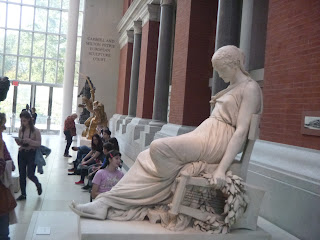




















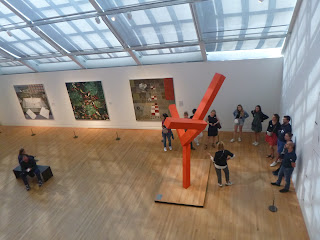





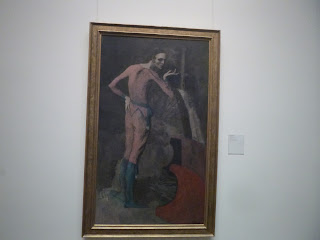
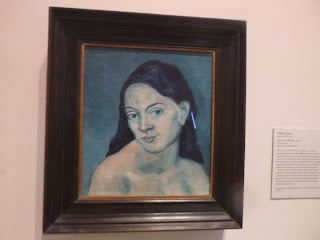






































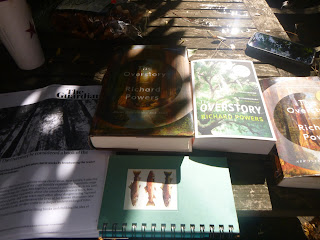































No comments:
Post a Comment